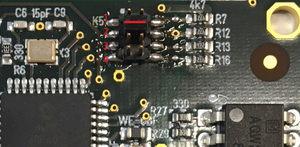Difference between revisions of "Additional DIO-Boards of the DCi Control Electronics"
From Wiki
| Line 4: | Line 4: | ||
# Turn off the robot and disconnect from power source. | # Turn off the robot and disconnect from power source. | ||
# Turn the robot on its side. Once flipped one its side. You will see the electronics modules installed in the robot. | # Turn the robot on its side. Once flipped one its side. You will see the electronics modules installed in the robot. | ||
| − | # If there is only the standard DIO module installed, bridge the second pin-set of header K5 as shown in figure 1.[[file:DCi_second_DIOmodule.png|thumb|300px|To configure the second DIO module, bridge the second pin-pair of K5 as shown here.]] | + | # If there is only the standard DIO module installed, bridge the second pin-set of header K5 as shown in figure 1 using a jumper (supplied with the module). (If there are already two DIO modules installed, bridge pin 3 of K5.)[[file:DCi_second_DIOmodule.png|thumb|300px|To configure the second DIO module, bridge the second pin-pair of K5 as shown here.]] |
| + | <br clear=all> | ||
| + | # | ||
Revision as of 11:03, 21 November 2018
The DCi Robot is shipped with one DIO module as standard. Should you require additional digital inputs and outputs, two additional DIO modules can be added. The hardware installation is simple, however, you need to get access to the underside of the robot.
Hardware installation
- Bring the robot into the referencing position, so that you can later turn it on its side.
- Turn off the robot and disconnect from power source.
- Turn the robot on its side. Once flipped one its side. You will see the electronics modules installed in the robot.
- If there is only the standard DIO module installed, bridge the second pin-set of header K5 as shown in figure 1 using a jumper (supplied with the module). (If there are already two DIO modules installed, bridge pin 3 of K5.)
